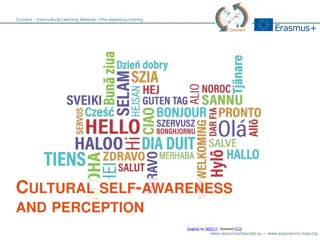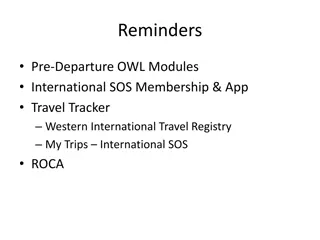Exploring Intercultural Communication for Global Understanding
Intercultural communication is vital for enhancing cross-cultural understanding and fostering a harmonious global community. Through language and culture, we gain insights into different perspectives, values, and behaviors. This facilitates effective interactions between collectivist and individualist cultures. Understanding cultural nuances and adapting communication styles can bridge cultural gaps and promote mutual respect and cooperation.
- Intercultural communication
- Global understanding
- Cultural diversity
- Cross-cultural interactions
- Language and culture
Download Presentation

Please find below an Image/Link to download the presentation.
The content on the website is provided AS IS for your information and personal use only. It may not be sold, licensed, or shared on other websites without obtaining consent from the author. Download presentation by click this link. If you encounter any issues during the download, it is possible that the publisher has removed the file from their server.
E N D
Presentation Transcript
Intercultural communication increases our understanding about other cultures and it is an effective way to make our world a better place.
``Language carries culture, and culture carries, particularly through orature and literature, the entire body of values by which we come to perceive ourselves and our place in the world`` (Ngugi 1986, Intercultural Communication: page 15-16)
Collectivist Cultures: Asian, African and Natives of Canadian and Americans Less focus on verbal interactions More focus on nonverbal interactions Often use indirect style More reliant on hierarchies Implicit: Context is more important Silence/long pauses are valued Individualist Cultures: Mostly Anglo- European Americans More focus on verbal interactions Less focus on nonverbal interactions Mainly use direct style Value equal status Explicit: words are more important Silence is viewed incompetent & uncomfortable
Recommendations for individualists interacting with collectivists: Recognize that collectivists pay attention to group memberships and predict behavior thereby. Recognize that collectivists change their behaviors when they change group membership. Don t force equality of status vertical hierarchies are ok. Avoid overt competition emphasize harmony and cooperation instead. Avoid threatening another person s face help them save face when necessary. Recognize that collectivists do not separate criticism of an idea or action from criticism of the person. Avoid overt confrontation use a strategy of indirection or just let go of the conflict. Behave more formally than usual in initial interactions. (World Bank, 2013)
A different language is not just a dictionary of words, sounds, and syntax. It is a different way of interpreting reality, refined by the generations that developed the language. -- Federico Fellini Filmmaker and director, Italy
Provides people with a system of assumptions about what is mutually known and understood our common ground. Is the process of using our own assumptions to interpret the messages and actions of other, thereby inferring their motives and intentions
Write from right to left. Write very clearly. Sloppy writing will be discarded. Fill in every blank. For #3 use the Islamic calendar, which begins November 4, A.D. 622 Do not answer #7 unless you have a green strip of paper Complete this task within three minutes Ask no questions
Consider: Fourth floor The fourth floor in an American building is three flights of stairs up. The fourth floor in a British building is four flights of stairs up. The fourth floor in a Korean building often doesn t exist. Consider: If identifying the fourth floor is so difficult, what happens when we are talking about something really important?
Korean Elevator U.S. Elevator The 4th floor in Korea has the same status as the 13th floor does in the US. The pronunciation for 4 is sa which is the same as the Chinese character for death , hence they use F (for Fourth) instead of 4 in elevators.
Translate this sentence! British English: I was waiting in queue for the loo before getting some petrol for my lorry when I realized I left the hob on and the aubergines were probably burning! American English: I was waiting in line for the bathroom before getting some gas for my truck when I realized I left the stove on and the eggplant was probably burning!
Non-native English speaker speaking English Thinks in other language; often must interpret incoming and outgoing messages Often limited vocabulary Often lacks sensitivity to subtleties of English language conversations Since messages are not always clearly understood, action implications can also be unclear. Native English speaker speaking English Thinks in English Speaks in English Understands subtleties of English language conversations Since messages are usually clearly understood, action implications are also clear.
Monochrome Polychrome Time Sense of self and space Informal Formal Men vs Women Titles Roles and Status Decision Making Customs Quick decisions, little details Very detailed trust first
Continued Material wealth Efficiency Politeness Social Values Legal and Ethical Behaviors Bribes Custom Masculine vs. Feminine Achievement, wealth, assertiveness Relationship, quality of life Individual Group Achievements
Smile! It is validating. State message clearly; slow down. Repeat message using different words, if possible. Back up spoken message with written materials. Speak in the other s language, if possible. Avoid using idioms, slang, jargon, or ambiguous words. Be careful about the use of humor. It is often difficult to understand jokes outside our own culture. Convey message in ways that are not offensive or threatening to others.
State your expectations and assumptions clearly. Deal with questions and concerns as they arise. Be patient; repeat message as often as needed. Ask each side to state the other s position as he/she sees it. Avoid being so polite or subtle that message context gets lost.
Observe body language for signs of distress, anger, or confusion. Be patient and understanding. Take a break when appropriate. Mentally change places with others, asking yourself how they would respond to what you are saying. Notice your own reactions to the situation.
Slow Down (Tone, Volume, Speed) Avoid Slangs Avoid Negative Questions Allow Time for a response Be Supportive Check Meanings Verbal and Visual Cues Naming Systems























